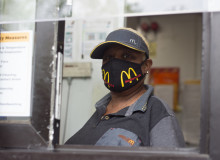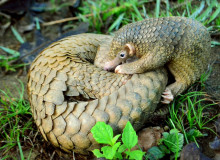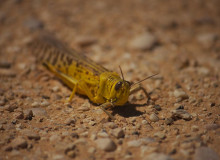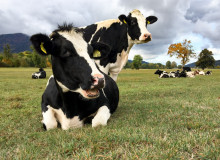op-ed
George Washington University
Climate change is not the great equalizer. Perhaps this characteristic makes it more difficult for some of us to agree that the threat is real.

Restaurant employees — often low-wage earners with no employer-provided health insurance — were deemed "essential workers" during the pandemic. (Paul Sableman/Creative Commons)
The George Washington University
Throughout this pandemic we’ve seen a vast amount of people be affected in different ways. But COVID-19 has especially exposed the discrepancies facing people from marginalized groups.

Photographed in the forests of Palawan, a Philippine pangolin pup nudges its mother, rolled up in a protective ball. (Gregg Yan/Creative Commons)
Planet Forward Senior Correspondent
Pressuring governments to issue bans and closures of wet markets could prevent the emergence of infectious disease. But it does not solve the widespread issue of bushmeat circulation between hunters and their families.
Founding Director, Planet Forward
How can we apply the lessons we are learning now to the next looming threat — climate change — recognizing that it will, by necessity, take a back seat until the current health emergency and economic crisis subside?

A recent investigation into the devastating desert locust outbreak spreading across East Africa has led me to some troublesome conclusions on the problematic nature of media coverage on Africa in the United States. (Adam Matan/Creative Commons)
Planet Forward Senior Correspondent
A recent investigation into the devastating locust outbreak spreading across East Africa has led me to some troublesome conclusions on the problematic nature of media coverage on Africa in the United States.
Planet Forward Senior Correspondent | Middlebury College
How can we integrate everyone in outdoor recreation? It starts with positive changes in leadership — both coaches and role models.
Cal State LA
A longtime opponent of environmental advocacy, the personal politics of Brazilian president Jair Bolsonaro have made him an international liability.
Planet Forward Correspondent | Eckerd College
Based on her experience, Planet Forward Correspondent Cassandra Hobar challenges the basis of anti-captivity movements, while supporting zoos and aquariums for the work they do in conservation and species preservation.

(Su Neko/Creative Commons)
Health In Harmony
"Our over-consumption of Earth’s resources has destroyed animal habitats, polluted the environment, and decimated wildlife populations. Humans created this crisis. We are also able to stop it."
Planet Forward Senior Correspondent | Cornell University
Beef is a major player in our food system, but at what cost? Correspondent Katherine Baker discusses the effects of beef on the environment and our health in this op-ed.





.jpg%3Fitok=YoNajIW7)
